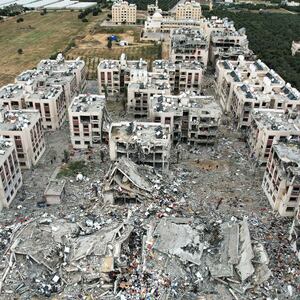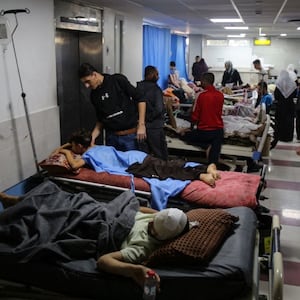World leaders around the globe have been pressing Israeli officials in public and behind closed doors to tame their military attacks on Gaza to curb the killing and displacement of civilians, as the Palestinian death toll has surpassed 15,000.
A group of former Israeli Defense Forces soldiers is calling on the Israeli government to course correct, too. Ori Givati, advocacy director for Breaking the Silence, a group of Israeli veterans who oppose the Israeli occupation of the Palestinian territories, said he believes Israel should be responding to the Oct.7 attacks—but that it has to do so in a way that isn’t so cruel.
“This war is different than all these other operations because of the massacre,” Givati told The Daily Beast. “Israel has the right to defend itself from Hamas. But it does not mean that we can just do whatever we want.”
The warning comes from people who have seen and experienced firsthand just how horrible Hamas’ attacks were against Israel on Oct. 7. Givati’s family members were huddling in their shelter while Hamas terrorists burned their home down and killed some of his team members and colleagues in the peace-building community.
Breaking the Silence has been reeling ever since. “We’re still collecting the pieces here,” Givati told The Daily Beast.
But while the organization believes Israel has a right to defend itself against Hamas, it says the government must make different decisions about how it goes about eliminating the group

Israeli Prime Minister Benjamin Netanyahu visits Gaza, during a temporary truce between Hamas and Israel, in this handout obtained by Reuters on Nov. 26, 2023.
Avi Ohayon/GPO/Handout via Reuters“Right now the leadership, the way they talk... some of them are talking about resettlement in Gaza. Some of them talk from a place of revenge, that we have to flatten Gaza and stuff like that. All of these things are very troubling for two reasons,” Givati said. “First, because of course they are immoral and inhumane.”
Second, the operations should be rooted in a vision that can create a path forward for future peace, rather than creating a path that will return the region to an untenable status quo of ongoing fighting and hatred, he said.
“We have to understand where are we going from here,” Givati said, noting that the Israeli government ought not to do anything just for revenge, but rather for the purpose of reaching political resolution.

Israeli forces bomb Gaza on Dec. 3, 2023.
MENAHEM KAHANA/Menahem Kahana/AFP via Getty ImagesThe way Israel is carrying out its operations against Hamas, by inflicting seemingly endless bloodshed and murder against innocent populations, is likely not going to help make any progress on the path towards peace. It will only likely anger and further entrench division between Palestinians and Israelis, making peace that much more elusive, Givati fears.
“Is this going to make me or us Israelis safer, or is it going to just prolong the occupation more and more and leave us in this never ending cycle of bloodshed? That is clearly not working,” Givati said. “If we will kill tens of thousands of civilians, or destroy so much infrastructure, it will not bring our family and friends that were killed or our hostages back to us. And revenge is not a war plan.”
Israel’s best interests lie in a peace-building approach rather than the seemingly indiscriminate killing seen in Gaza, said U.S. Army Lt. Gen. Mark Schwartz, the former United States Security Coordinator for Israel and the Palestinian Authority from 2019-2021.
“What I struggle with and what I think a lot of senior leaders are dealing with: Why wouldn’t the Israelis do all they can to reduce the pain and suffering on the Palestinian population,” Schwartz told The Daily Beast.
Instead, Israel seems to be on the path to creating more entrenched division, he said.
“Ideally you haven’t pissed off the local population,” Schwartz said, adding that Israel is “increasing the risk of the IDF soldiers after this. You’re creating another whole generation of Palestinians who absolutely will not forgive the Israelis.”
At Breaking the Silence, team members work to gather testimony from former Israeli soldiers who participated in previous operations in Gaza in order to assess how changes can be made moving forward, said Givati.
The Israeli government has relied on warning civilians to leave certain regions so the IDF can carry out attacks, only to then use permissive rules of engagement, killing enemies and civilians alike.

Israeli soldiers deployed on the southern border with Gaza on Nov. 29, 2023, gather for a briefing next to battle tanks.
Menahem Kahana/AFP via Getty ImagesTestimonies from past conflicts have shown that the IDF has greenlighted operations to launch full speed ahead after warning civilians.
“The perception is that anyone you see is a terrorist,” says one testimony from a former IDF soldier from previous campaigns.“They told us: there aren’t supposed to be any civilians. If you identify someone—you shoot them,” says another.
Breaking the Silence wants to flip the assumption about how to carry out war with Gaza on its head, so that strategy is aimed at real resolution, not just the blind use of old tactics.
“The lessons drawn from past conflicts were always about the proper application of these principles, never about the validity of the principles themselves,” Nadav Weiman, a member of Breaking the Silence, writes at GroundUp. “We should question our assumptions: the lesson we should draw from past conflicts is that force alone cannot afford us Israelis the security we deserve.”
The Israeli government’s plan now must include a solution that addresses the roots of the conflict and a realistic assessment of what should happen after the war is over, according to Breaking the Silence.
“What’s the point of sacrificing so many soldiers and killing so many innocent people, if at the end of the day we will go back to… where we were before?” Givati said.

Palestinians carry wounded children following an Israeli strike on a house in Rafah, in southern Gaza on Dec. 1, 2023.
Hatem Khaled/ReutersDissent
As of yet, Breaking the Silence has not gathered testimonies or thoughts from soldiers that are part of the current war, so there are some gaps in its knowledge about the current thinking within military ranks.
Anecdotally, Givati said he has heard there are some who disagree with the way the Israeli government is carrying out attacks in Gaza, while others appear to support the government’s campaigns.
“We don't have testimonies right now from this war that’s been going on,” Givati said, adding that “there are soldiers there that think like that, there are soldiers there who hate the fact that the ministers are talking about rebuilding the settlements, but there are also soldiers there who came… saying we will go back here and put them in homes in Gaza.”
Israel withdrew troops from Gaza in 2005, ending a decades-long Israeli presence in Gaza, but some Israelis have expressed support for the idea of moving back to the enclave after the war.
Prime Minister Benjamin Netanyahu has suggested that Israel would take on security responsibilities for Gaza after the war for an “indefinite period.”
The Biden administration does not support Israel reoccupying Gaza, John Kirby, White House national security coordinator, has told reporters.
“We don’t support a reoccupation of Gaza by the Israeli Defense Forces,” Kirby told reporters earlier this month. “A reoccupation by Israeli forces is not the right thing to do.”

Israeli forces intervene against Palestinians who wanted to perform the Friday prayer at Al-Aqsa Mosque, after Israeli authorities barred Palestinians from entering Al-Aqsa Mosque in East Jerusalem on Dec. 1, 2023.
Mostafa Alkharouf/Anadolu via Getty ImagesLessons in Listening
The conversation about what the political resolution for Gaza will look like in this conflict is ongoing.
Israel and Hamas reached a temporary ceasefire agreement in late November to arrange for the release of Hamas hostages taken on Oct. 7 and allow more aid into the enclave. Through a series of hostage and prisoner exchanges, both sides agreed to extensions.
But the ceasefires have provided only temporary relief. With both Hamas and Israel accusing either side of violating the ceasefire, a return to conflict perpetually hangs in the balance.
On Friday, Israel renewed its combat operations amid reports that the ceasefire collapsed. Talks of extending the ceasefires fell apart, according to the State Department.
The Biden administration accused Hamas of causing the breakdown.
“It came to an end because of Hamas,” U.S. Secretary of State Tony Blinken told reporters Friday. “It reneged on commitments it made in terms of releasing certain hostages.”
Israel also directed blame on Hamas for the ceasefire collapse. The IDF reported that the military detected rocket fire headed towards Israel from Gazan territory on Friday morning.
“Hamas violated the operational pause, and in addition, fired toward Israeli territory,” the IDF said in an alert. “The IDF has resumed combat against the Hamas terrorist organization in Gaza.”
“Hamas only understands force and therefore we will continue to act until we achieve the goals of the war,” Israeli Defense Minister Yoav Gallant said.
The Biden administration been pressing Israeli officials to take more precautions with its attacks in Gaza, particularly if they extend into southern Gaza, while acknowledging that to oust Hamas means inevitably hitting civilian infrastructure. Hamas has been accused of deliberately taking over civilian buildings and entities to shield itself.
“From the President down, we have reinforced this in very clear language with the government of Israel,” a senior administration official told reporters in a recent brief. It must be “extremely carefully thought through.”
But the efforts to convince Israel to change course in its rampage doesn’t appear to have a clear resolution.
Gazans interviewed by Reuters Friday said they feared the bombing in southern Gaza could signal that the war is expanding even further into areas that Israel had previously designated as safe.
U.S. officials have warned Israel that they are keeping a close eye on Israeli efforts to protect civilians from their own strikes.
“I made clear that after the pause it was imperative that Israel put in place clear protections for civilians,” Blinken told reporters Friday following a visit to the region. “And we’ll be looking at that going forward. It’s very, very important.”








